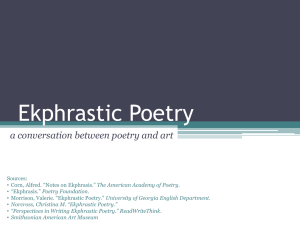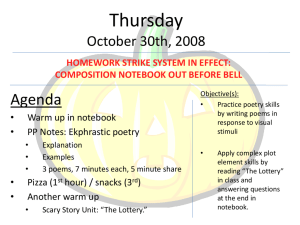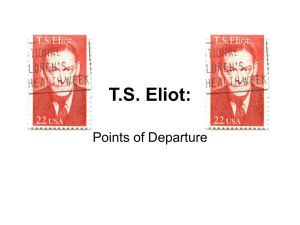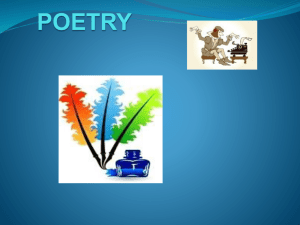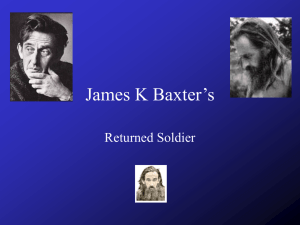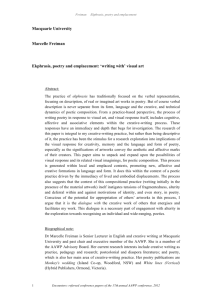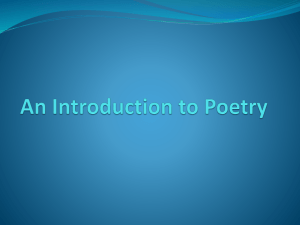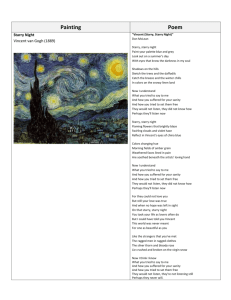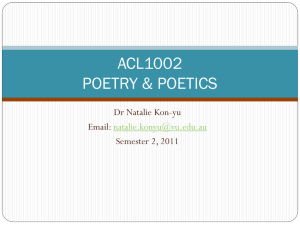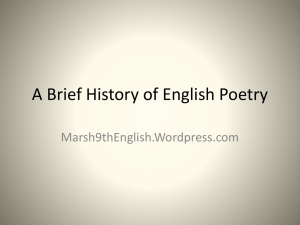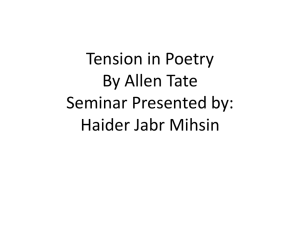Ekphrastic Poetry.
advertisement
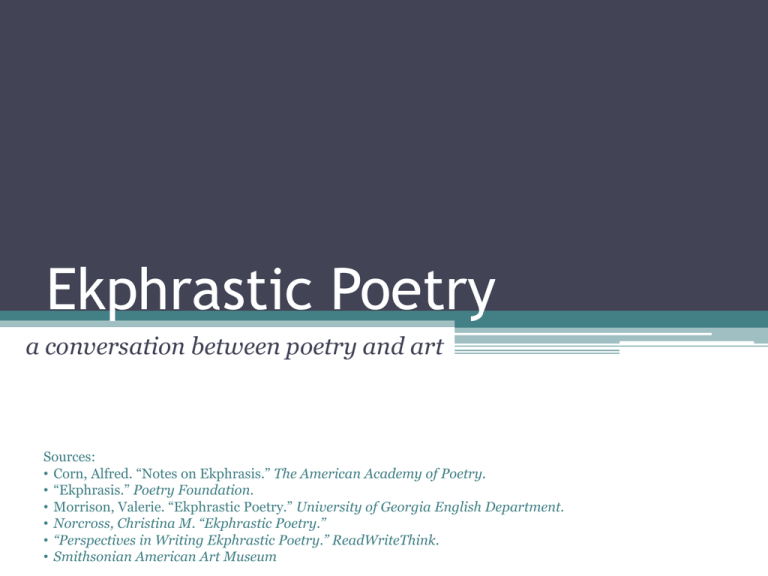
Ekphrastic Poetry a conversation between poetry and art Sources: • Corn, Alfred. “Notes on Ekphrasis.” The American Academy of Poetry. • “Ekphrasis.” Poetry Foundation. • Morrison, Valerie. “Ekphrastic Poetry.” University of Georgia English Department. • Norcross, Christina M. “Ekphrastic Poetry.” • “Perspectives in Writing Ekphrastic Poetry.” ReadWriteThink. • Smithsonian American Art Museum Ekphrastic Poetry Definitions • Ekphrasis (Etymology) ▫ ek: “out of” ▫ phrasis: “speech or expression” • Ekphrastic Poetry (Definition) ▫ A poem inspired by a work of art • Ekphrastic Poetry (Explanation) ▫ It is a vivid description of a work of art. ▫ The poet interprets the art and then creates a narrative that represents his or her reaction to it. ▫ Simply put, it is a conversation between poetry and art. Starry Night "The Starry Night" Vincent van Gogh (1889) Anne Sexton (1961) The town does not exist except where one black-haired tree slips up like a drowned woman into the hot sky. The town is silent. The night boils with eleven stars. Oh starry starry night! This is how I want to die. It moves. They are all alive. Even the moon bulges in its orange irons to push children, like a god, from its eye. The old unseen serpent swallows up the stars. Oh starry starry night! This is how I want to die: into that rushing beast of the night, sucked up by that great dragon, to split from my life with no flag, no belly, no cry. The Millinery Shop Edgar Degas (1890) “Edgar Degas: The Millinery Shop” (excerpt) Adam Zagajewski (1994) Hats are innocent, bathed in the soft light which smoothes the contours of objects. A girl is working. But where are brooks? Groves? Where is the sensual laughter of nymphs? The world is hungry and one day will invade this tranquil room. House by the Railroad Edward Hopper (1925) “Edward Hopper and the House by the Railroad" (excerpt) Edward Hirsch (1995) Out here in the exact middle of the day, This strange, gawky house has the expression Of someone being stared at, someone holding His breath underwater, hushed and expectant; This house is ashamed of itself, ashamed Of its fantastic mansard rooftop And its pseudo-Gothic porch, ashamed of its shoulders and large, awkward hands. But the man behind the easel is relentless. He is as brutal as sunlight, and believes The house must have done something horrible To the people who once lived here Because now it is so desperately empty, It must have done something to the sky Because the sky, too, is utterly vacant And devoid of meaning. American Gothic “American Gothic" (excerpt) Grant Wood (1930) John Stone (1998) Just outside the frame there has to be a dog chickens, cows and hay and a smokehouse where a ham in hickory is also being preserved Here for all time the borders of the Gothic window anticipate the ribs of the house the tines of the pitchfork repeat the triumph of his overalls and front and center the long faces, the sober lips Homework: Write an Ekphrastic Poem • Image: Choose a well-known work of art ▫ Art photography is also acceptable ▫ Think museum quality artwork ▫ Caption required: Title of piece (italics). Name of artist. Year. • Poem: 10 line minimum ▫ No requirements regarding rhyme, meter, or form ▫ Title your poem • Format: Include both image and typed poem on same page ▫ Option 1: Image at top of page, poem below ▫ Option 2: Image on left of page, poem on the right ▫ Print in color Ekphrastic Poetry: Approaches Consider the following suggestions when writing your poem: • Write about the scene being depicted in the artwork • Write about your experience of looking at the art • Write in the voice of a person or object shown • Write in the voice of the artist • Speculate about why the artist created this work • Write a dialogue among characters in a work of art • Speak directly to the artist or the subject(s) of the piece • Imagine a story behind what you see • Relate the art to something else it reminds you of • Imagine what was happening while the artist was creating the piece
